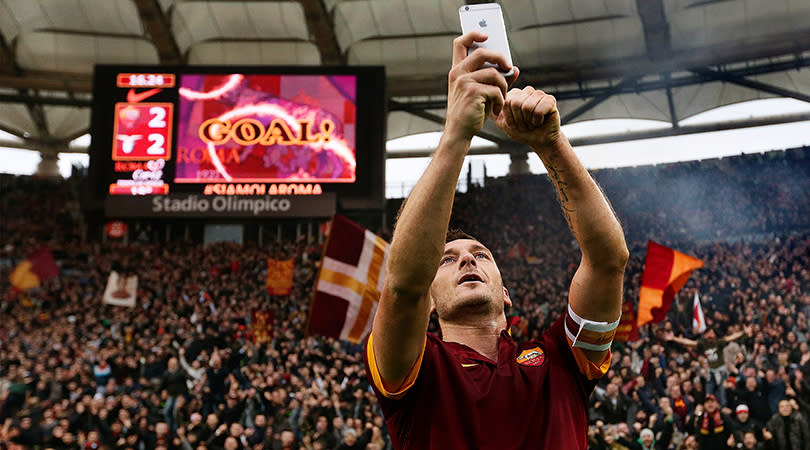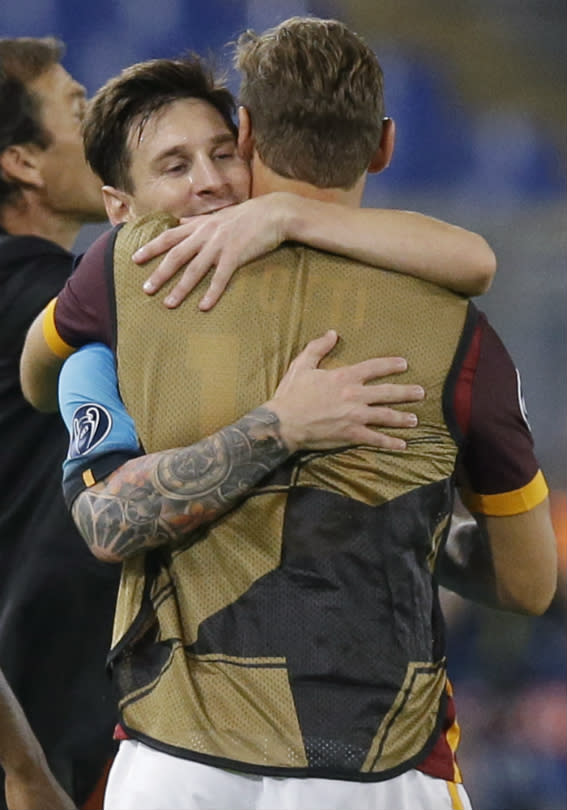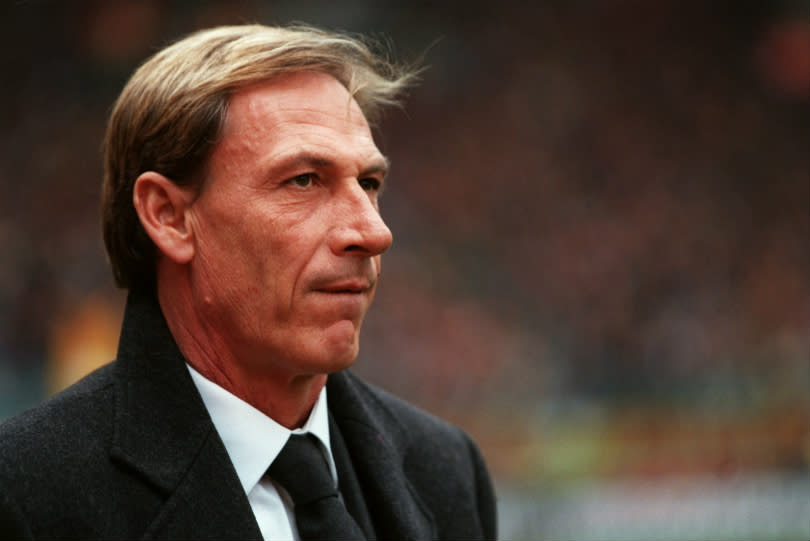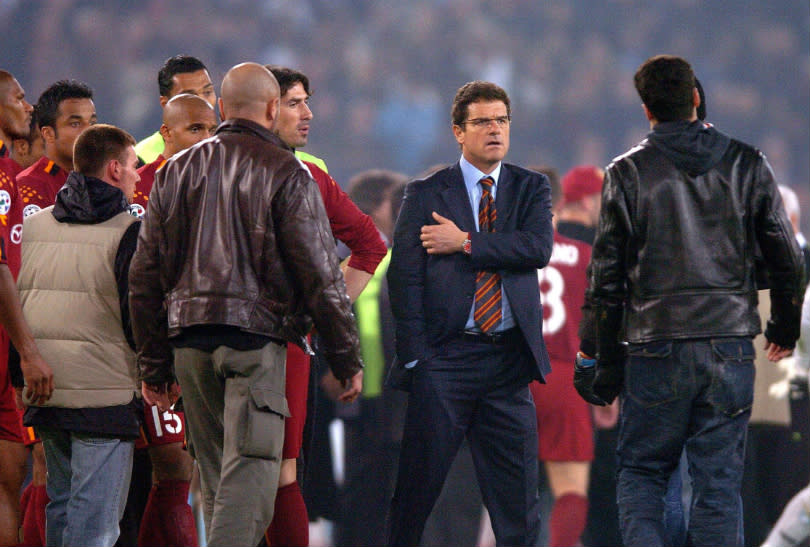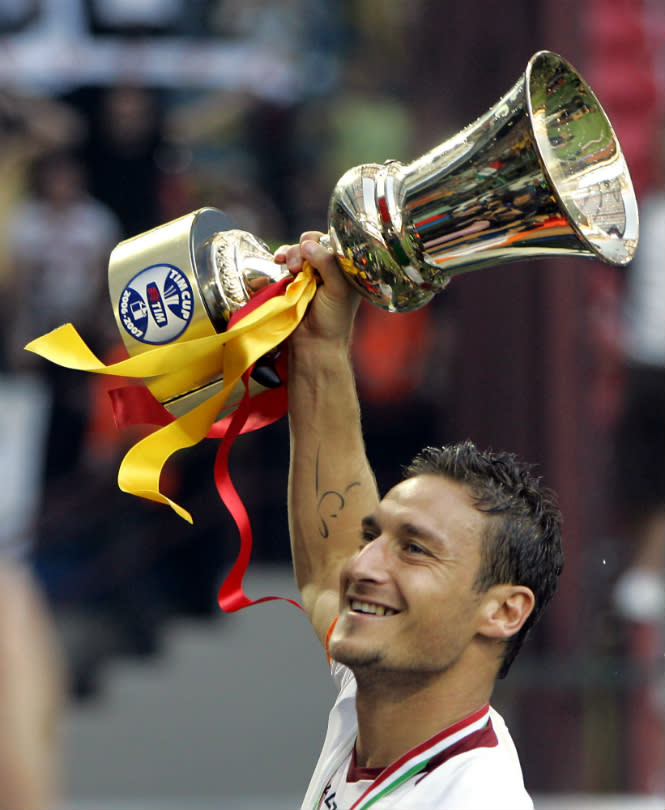Francesco Totti – Romes greatest son who never got the love he deserved
(Please note: this feature originally appeared in the February 2016 issue of FourFourTwo magazine. Subscribe today! 6 issues for £19)
“He’s a little t***, that Totti. I can’t see what all the fuss is about.” It’s certainly not the worst thing Ron Atkinson ever said, but it must be the most vacuous. Still, Big Ron’s mind was probably elsewhere, as he followed this priceless morsel at the 2002 World Cup – his last tournament as an ITV pundit – with the words: “Are there any sandwiches? I’m starving.”
Yet the former Manchester United and Aston Villa manager is far from alone in English football’s mistrust of Francesco Totti. Fast-forward almost a decade and Terry Venables, Glenn Hoddle and Graeme Souness – who displays his anti-Totti badge with the unflinching pride of a Victoria Cross recipient – combined to damn the Roma forward with the faintest of praise after scoring the winner in a 2010 Champions League group game against Bayern Munich. “He’s never been accused of being a workaholic,” smirked Souness. “Yeah, he’s got talent, but you know my thoughts on him.”
Hoddle took up the baton. “No, he’s not top drawer. He’d have moved on if he was. Someone would’ve come and got him.”
“Glenn’s right,” concluded Venables. “He has been a luxury.”
The wider British football public has long made snap judgements on Totti, largely based on little more than a handful of performances – a Champions League quarter-final here, a World Cup game there. He is a riddle we can’t be bothered to untangle, with four major honours (a Serie A title, two Coppas Italia and one World Cup) at which we scoff.
It comes down to a lack of knowledge. All most Brits know about the 39-year-old is his extreme longevity and unbroken 26 years at Roma since joining as a 13-year-old in 1989. He has never left his boyhood club – we’re talking about a seventh generation Roman here – and, therefore, never got beyond the last eight of the Champions League or finished higher than fifth in the Ballon d’Or voting.
On the continent, he’s revered as a paragon of loyalty. When Roma played Barcelona in a pre-season friendly, Lionel Messi demanded both Totti’s shirt and a picture, uploading the snap to Instagram with the caption: “A great! What a phenomenon!!” It got 1.8 million likes.
Cold, hard statistics back up the continental belief over the British one. Only Silvio Piola, in a bygone goal-hanging era, has scored more Serie A goals than Totti. He’s a five-time Italian footballer of the year. He won the European Golden Boot in 2007. And, of course, he won the World Cup in 2006.
Totti will be nearly 40 at the end of the season. As Il Re di Roma (‘The King of Rome’) approaches what may be his curtain call, FourFourTwo asks the coaches, former team-mates and fans why this gladiator of European football is so revered abroad, yet so mistrusted and misunderstood here.
Why does Francesco Totti matter? What makes him tick? How has he endured so long in the Eternal City? And can he score the 30 goals he requires to overhaul Silvio Piola’s all-time Serie A goalscoring record?
“I only touched the ball a couple of times – I was too excited and too happy”
“Go on, put the boy on.” Vujadin Boskov turned his gaze from Sinisa Mihajlovic, the busy midfielder offering his coach advice about substitutes, to a blond 16-year-old sat wide-eyed on the Roma bench a few seats away. The Giallorossi were 2-0 up with five minutes to go against Brescia, a disappointing season all but over in late March 1993.
“Warm up so you can go on straight away,” said Boskov to the boy, who was sat next to promising 22-year-old striker Roberto Muzzi. Yet he did nothing.
“Look,” huffed Muzzi, “he’s talking to you. Off you go.”
Later, the youngster recalled what happened next: “I went out, warmed up for 10 seconds and went on. I only touched the ball a couple of times – I was too excited and too happy.”
Francesco Totti had achieved a childhood dream, something he’s gone on to do more than 750 times since: play for Roma’s first team.
Imagining that moment a decade earlier, Totti perfected his dribbling up and down the Via Vetulonia, a tight street due south of the basilicas, coliseums and theatres that litter Rome’s ancient city centre. It’s a curious working-class mixture of Latin-red walls and post-war yellowish apartment blocks; a place nicknamed ‘tower-block Rome’, where everyone knows everyone.
Born to bank clerk father Lorenzo and housewife Fiorella, Totti always stood out. At nine months, he could walk. By four, after watching countless matches on the television in the family’s cramped apartment, his talent was already prodigious.
Once, on a family holiday to coastal seaside town Torvaianica, half an hour or so from central Rome, the infant Totti strolled down the beach with his father. Enzo asked a group of eight-year-olds if his son could join in. “He’s too small,” they insisted. “He might hurt himself.” Totti Sr insisted and the tiny four-year-old, wearing red shorts and a white shirt with the No.4 on the back, danced around children twice his age, leaving them open-mouthed.
Nobody has shaped Totti’s life quite like mum Fiorella, whose motto is: “You have to be serene and clean on the inside.” Often compared to the working-class characters portrayed by noted Italian stage actress Anna Magnani, she raised Francesco and his older brother Riccardo with a strong Catholic ethos. At one point she even took in Francesco’s future Roma team-mate and Italy international Antonio Cassano, in an effort to temper the playboy striker’s famously errant ways.
“I was also a bit of a crook,” recalled Totti. “I used to steal footballs. In the summer we would play all afternoon until sunset. Often, before going home, I took the ball, played it cool, and took off. I had a real collection. I gave them all back in the end. I wasn’t the best at school but I always paid attention and was well behaved, because of Mama.”
This is a character whose career feels predestined. The imposing Fiorella watched over her son’s studies, took him to training – at first Fortitudo, then Smit Trastevere and finally Lodigiani from 10 until 13 – and kept him on the straight and narrow. Sundays were spent going to mass, looking after ailing grandparents and playing cards around the dining table with the extended family.
“His family was a determining factor,” said Totti’s Lodigiani coach Emidio Neroni. “Enzo and Fiorella were there, but discreet, transmitting fundamental humility and seriousness. At 10, Francesco was tiny and fast. You could tell he was a natural talent. The challenge was not to hone his gifts, but to guide him in the right way. He had football in his DNA. He played dumb: he seemed to go missing. Then suddenly he would score.”
Soon, tongues were wagging about Rome’s brightest prospect in generations. Milan were interested, so were Juventus and, impossibly, so were Lazio. The Tottis, Giallorossi for decades, were having none of it and Fiorella marched into Lodigiani’s Trigoria training ground.
“Lodigiani,” remembers Gildo Giannini, who was then in charge of the Giallorosso youth system, “had already promised Totti to Lazio, but his mum Fiorella came to me demanding that Roma took him. I didn’t need much convincing – we already knew about him – and I got Lodigiani to sell him to us.”
Within a month, Totti was playing (illegally) two age groups above for the under-15s. He dedicated himself to being a Roma footballer, acting as a ball boy during the second leg of the 1991 UEFA Cup Final against Inter.
Still existing on a diet of bread, Nutella, margherita pizza and chips (hence the Rome dialect nickname Er Pupone – ‘the Big Baby’), the 15-year-old helped the under-17 side win a Scudetto later that year.
“I only had him for a month before he went to play for the U20s,” coach Ezio Sella tells FFT. “He immediately got my attention. You never see a player this young able to do such special things. From his first training session, I knew I had a legend in the making. He created things out of nothing. I just told him to never feel as if he’s made it, because everyone kept lauding him. Over time he’s proven this over and over again.”
Sella recalls that U17 title victory over Milan in 1991 like it was yesterday: “He hurdled every bad tackle, no matter how much they tried to stop him. Remember this is a team who had tried to sign him on more than one occasion. I played him as both a central midfielder and a forward, and he created both of the goals in a 2-0 win.
“He was the best player I’ve ever coached. He needed no technical coaching – that would’ve been a waste of time.”
Totti’s under-20s coach, Luciano Spinosi, will never forget the first time he saw his protégé play during pre-season. “After 10 minutes, I called Roma’s sporting director Giorgio Perinetti, telling him to never let this champion leave the club,” Spinosi tells FFT. “The way he hit the ball was like no one else. I’ve seen lots of young footballers, but he was special. He dragged the whole team with him. I just had to tell him to play. I had never seen a 16-year-old like this. He made my job easier.”
It was during an under-20 game in March 1993 against Ascoli that Totti’s world changed. With the first team about to depart for Brescia, head coach Boskov made the late decision to bring a 16-year-old Totti along for the ride. Fresh from scoring twice, he was substituted at half-time and got on the coach.
The following day came Mihajlovic, Boskov and the debut. He replaced Ruggiero Rizzitelli, an Italian international and Roma legend nicknamed ‘Rizzi-gol’ by the Giallorossi.
“We all expected his debut that day,” Rizzitelli tells FFT. “Many youngsters trained with the first team, but Totti was different. You don’t see many kids nutmeg a first-team player in training. But he had a huge personality to go with his talent. I told him to be calm and enjoy [his debut]. It’s only football. In a funny way, I’m proud that I was the guy who let Totti play for the first time. Every year someone calls me just to talk about that Brescia vs Roma game!”
“I almost didn’t want him to be discovered, because at 17 you can lose your head”
Over the following 18 months, Totti gradually gained first-team experience under Carlo Mazzone, a fellow Roman who is also responsible for converting Andrea Pirlo into a deep-lying playmaker. Ten minutes here, half an hour there. Theirs was and remains very much a father-son relationship – Totti looking up to his coach with wonder, Mazzone sheltering his precocious young talent from Rome’s harsh glare.
“I gave my staff a hard-nosed order,” says Mazzone. “Woe betide anyone who puts out the word that this Totti is so good. We all know what Rome is like, don’t we? I didn’t want anyone to ruin his development.
“I admit I guarded Francesco and his talent rather jealously. I almost didn’t want him to be discovered, because at 17 years old, especially in Rome, you can soon lose your head. I tried to protect him.”
The denouement to Totti’s first start, a man-of-the-match display against Sampdoria in February 1994, is illustrative of Mazzone’s plan. “Go and take your shower, kid,” he whispered to his adoptive son. “I’ll speak to them.” It’s little wonder that Totti wrote the foreword to Mazzone’s 2010 autobiography.
Six months later came Totti’s first Roma goal: a low, left-footed strike against Foggia on the opening day of the 1994/95 season. Er Pupone celebrated by going out for ice cream with big brother Riccardo, but what made it even more special was another familial connection. “My uncle had promised me a mountain bike,” Totti later recalled. “I wanted one, and perhaps I could have bought it without waiting for the goal, but I chased thinking of the bike. Having an objective has always helped me since then. It’s like I’m running towards something.”
Firebrand mother Fiorella, Mazzone the second father, his uncle-inspired first Roma goal – but what of his adopted Roma big brother? Nicknamed Il Principe (‘the Prince’), Giuseppe Giannini – whose father Gildo had signed Totti in 1989 – was Roma’s No.10 and playmaking star. English fans might recall him from Italia 90, where he impressed in the shadow of Roberto Baggio. Totti still cites inheriting his hero’s famous shirt as one of his proudest moments in football.
“He stood out straight away,” Giannini, who played 436 games for Roma and made 47 appearances for Italy, tells FFT. “Everything seemed so easy for him. What he’s done for Italian football cannot be underestimated. He is the best we’ve had.
“He was my room-mate. I saw in him a younger version of me, because he did the same things I did a few years previously. He tried to learn a lot from the other guys. I genuinely feel like his older brother. I knew his mum Fiorella well, too. I remember when he was looking for his first car: Francesco wanted a Volkswagen Golf GTI and his parents were worried and called me. I told them that my first car was a Mercedes!”
Family and a sense of belonging: intertwining themes in the Francesco Totti story.
In January 1997 a disillusioned Totti was set to leave Roma for Sampdoria
Soon, however, that sense of belonging was gone. After three promising but trophyless seasons, Mazzone was sacked in the summer of 1996 and Totti’s hero Giannini, winding down his career, left for Austrian side Sturm Graz. His de facto father and big brother had departed in a matter of weeks, replaced by Argentine head coach Carlos Bianchi.
Totti’s relationship with El Bozo (‘Bozo the Clown’) was strained from the start. Mazzone – a charismatic, avuncular born-and-bred Roman – had indulged Totti’s occasional love of the high life and less-than-extensive effort in training because of his extreme talent, but his successor at the Stadio Olimpico hated the club’s newfound symbol. Frequently dropped, and denied the No.10 shirt he so craved after Giannini’s departure, Totti became disillusioned and by January 1997 was set to leave for Sampdoria on an initial loan. Spurs were also interested in the 20-year-old.
“Bianchi couldn’t bear Romans and above all me, because I was young,” Totti later claimed. “Can you believe that in small-sided games he would line up ‘Romans against non-Romans’? My head was already in Genoa, and if I had gone, I wouldn’t have come back.”
Whether it was il vento di ponentino – the ‘west wind’ Romans believe warms the heart and dulls the mind – or just a love affair that couldn’t die, Totti remained. By April, with Roma languishing in the bottom half in Serie A, Bianchi gave chairman Franco Sensi a ‘Totti or me’ ultimatum. There was only ever going to be one winner.
Bianchi’s replacement in 1997/98 was the chain-smoking attacking nut Zdenek Zeman, the man who definitively put the ring on the Totti-Roma finger. Totti was immediately given the No.10 shirt and within a year was captain – at 22, the youngest in Serie A history.
“Actually, I wasn’t the one to choose him as a captain; the team did, after a vote,” Zeman tells FFT. “Our Brazilian centre-back Aldair had more votes, but didn’t want the responsibility. In that moment, the players recognised Francesco as their leader. He was and still is very calm – almost introverted. He might not be a dressing room shouter, but he’s the perfect leader for Roma out on the pitch.”
Totti responded brilliantly, scoring 30 goals and providing 26 assists in two seasons under Zeman, the Giallorossi finishing fourth and fifth. One of the 30 was Totti’s first cucchiaio ‘spoon’ lob, in November 1997 against a young Gianluigi Buffon’s Parma. More would follow.
YOU ASK THE QUESTIONS... Gianluigi Buffon: You have to be a real masochist to play in goal – and a bit perverse
“Zeman wants me to entertain,” he said at the time. “People go to the stadium for the spectacle, not just to see us win. Entertaining is an honour and a responsibility. It pushes me to try to produce a piece of skill, like the lob at Parma.”
Or his Panenka penalty a few years later in the Euro 2000 semi-final against Holland, an effort of such breathtaking confidence it stunned Edwin van der Sar in the Dutch goal. It was no coincidence Totti had started the match on the bench; his penalty was a representation of his dissatisfaction with coach Dino Zoff. Though Italy lost the ensuing final to France, Totti was man of the match.
The Zeman era at Roma was the first to show Totti’s adaptability. He spent two years not as a classic No.10, but on the left of a zonal front three. And there you were, thinking he’s a luxury playmaker capable only of playing as a genuine No.10...
“From the side, he could cut inside much easier than as a centre-forward,” Zeman tells FFT. “The opposition foul him so much playing centrally, it was too dangerous. He never complained about the position, because where I played him he was more in the action.”
It was also under Zeman that Totti, with an 81st-minute equaliser in November 1998, first did what no other player has done more often: score in the Rome derby.
“That was one of the two most beautiful things I’ve experienced as a Giallorosso,” Roma fan Guglielmo Casalini tells FFT. “We went 1-0 up, but Lazio came back to lead 3-1, then missed a penalty, and we went down to 10 men. Then Totti, who’d been outstanding throughout, equalised and Marco Delvecchio could even have won it for us.”
Casalini’s other most beautiful moment? That would come three years later, in June 2001, against Parma at the Stadio Olimpico: Roma’s third Serie A title, and first for 18 years.
The team that future England coach Fabio Capello assembled was formidable, boasting Cafu, Walter Samuel and Aldair in defence, Hidetoshi Nakata and Emerson in midfield and Totti, Vincenzo Montella and top scorer Gabriel Batistuta – a trident that scored 47 of Roma’s 68 Serie A goals in 2000/01 – in attack.
“He knows everything,” Batigol tells FFT. “He’s the best strike partner I have ever played with. He thinks fast and knows what the striker wants because he’s also one himself. That’s a big advantage. Nobody enjoys an assist like Francesco. He used to dummy defenders, break, accelerate, dribble – it was indecipherable for them and for me. He made my knees ache!”
Unsurprisingly, a 13-goal Totti was voted footballer of the year, utterly unburdened by either the weight of history or his own talismanic status. Still only 24, with Antonio Cassano and a teenage Daniele De Rossi waiting in the wings, this Roma team should have dominated Serie A.
Yet the marriage between Totti and Capello was destined for divorce. Both of them were too headstrong, too opinionated, too convinced they were ultimately responsible for that Scudetto, for any lasting union. The austere coach and anarchic talent tolerated each other, but it descended into petty bickering. The captain usually started it but his coach would always retort, once saying: “Here, you have to decide whether you’re a Totti fan or a Roma fan.”
The definitive rupture came halfway through the 2003/04 campaign, which was Capello’s last in Rome. Capello tore into Totti in front of the whole team, calling him a slacker who never tried in training. The press were the first to know and coach blamed captain, while captain blamed coach for not being flexible enough to fit both himself and Cassano in the same team.
He and Capello have since made up, but Totti is far from the easiest player to manage. During Luis Enrique’s solitary season with Roma in 2011/12, the current Barcelona boss struggled to deal with Il Capitone’s personality ruling above all others. Yet, without that campaign, Enrique wouldn’t have dealt with Lionel Messi’s mini-tantrum in January 2015 before los Cules swept to a Treble six months later.
The birth of a false nine
If the sign of a truly great footballer is that they evolve as they age, there can be no better player than Totti. It isn’t that he’s got better; it’s merely that he focuses on the strengths that haven’t diminished, rather than attempting to improve a weakness that can never be recovered.
Although the Giallorossi would cite the Capello era and Serie A title as Totti’s best, his most sustained successful spell came under Luciano Spalletti. Turning 30 at the start of Spalletti’s second term, Totti won the Coppa Italia twice and finished Serie A runner-up three times in the follicly-challenged coach’s four-and-a-half seasons at the Stadio Olimpico.
Crucial to that success was the adaptability and football intelligence Totti had already shown under Zeman in the late 1990s. It may have been born out of necessity – Cassano, Vincenzo Montella and Shabani Nonda were all injured – but against Sampdoria in December 2005, Totti operated as a centre-forward for the first time since the youth team.
But this was no conventional targetman. Totti interpreted his role with a roaming brief, frequently dropping deeper behind the onrushing midfielders Mancini, Rodrigo Taddei and Simone Perrotta to cause havoc for his markers. To follow or not follow? That was the question. The 4-6-0 formation had been born; Roma went on an 11-game winning run, then a Serie A record.
“Giving him the ball is like putting it in the bank,” said Spalletti halfway through the run. “Francesco is fundamental to the dressing room and the city. He deserves all the titles awarded to him, and everything that is said about him. Totti is the best player in the world.”
Totti scored 15 goals in 24 league games – including another audacious chip, this time against Inter at the San Siro – and was flying before an ankle injury all-but ended his domestic campaign in February 2006.
Only the ceaseless work of his personal trainer Vito Scala, whose wages are included as part of Totti’s Roma contract, got him fit for that summer’s World Cup (as well as Italy boss Marcello Lippi’s promise he’d be picked). Totti played in all seven matches as the Azzurri lifted the World Cup for a fourth time, finishing with four assists (the joint-most in the competition) as well as scoring the winning goal – a blasted penalty in injury time – in the last 16 clash with Australia.
World champion, and voted into the overall team of the tournament – yet still Totti’s performances were criticised, even in Italy.
“I am sorry not to have been at 100 per cent,” Totti said later. “But, after everything that happened, if someone had said at the beginning of the tournament, ‘You can be there and only 30 per cent fit and win the World Cup’, I would’ve accepted it willingly even if not playing at my best.”
His riposte, in 2006/07, was his best season personally as a professional, and the European Golden Boot. In 50 games in all competitions, he scored 32 goals and bagged 15 assists as Roma won the Coppa Italia (right) and were Serie A runners-up to Inter.
He also scored what many believe to be his best ever goal: a left-foot volley of such savage beauty at Sampdoria that the Luigi Ferraris ground rose to applaud (this in Italy, the land that fair play forgot).
“He showed me the way to go – players of that ilk mould themselves,” Spalletti later said. “Bringing Francesco closer to the box is like putting the wolf close to the chicken coop: he always finds the space to create terror.”
Yet for all that campaign’s highs, it also brought one of Totti’s lowest points – a 7-1 drubbing at Old Trafford by Manchester United in the quarter-finals of the Champions League. It’s scorelines such as these that help to cloud the judgement of Francesco Totti on British shores.
What few appreciate, however, is that it was Totti’s performance in the first leg (a 2-1 Roma win in the Stadio Olimpico) that convinced Alex Ferguson to deploy his own strikerless system the following season, with Cristiano Ronaldo, Wayne Rooney and Carlos Tevez all interchanging positions. United won the Premier League and Champions League.
Since that annus mirabilis, Totti has remained remarkably consistent. At the time of writing, 145 of his 300 Roma goals had come since he turned 30. In comparison, Alan Shearer managed 84; Roberto Baggio, 80. It’s an incredible achievement that, in an increasingly physical game, will surely become impossible to match.
In scoring three days after his 38th birthday against Manchester City in September 2014 – a delicious dink over an onrushing Joe Hart – he became the oldest goalscorer in Champions League history, a record he soon extended with a free-kick against CSKA Moscow.
To an extent, goals have replaced trophies for Totti. His appetite whetted under Spalletti, Totti has, since September 2009, played for Claudio Ranieri, his former team-mate Montella, Luis Enrique, Zeman (again), Aurelio Andreazzoli and current boss Rudi Garcia.
Luis Enrique and Montella played him as a trequartista, Garcia as a Spalletti-style roaming false nine, while Zeman, during his second spell in the Giallorossi dugout in 2012/13, deployed a 36-year-old Totti again as a nominal left-winger. “I found the same player,” the Czech chain-smoker tells FFT, “just with some more nails in his ankle! He used to prefer the assist, but his coaches have told him that to be considered a great he had to score more goals.
“He has become more individualistic and selfish. Other coaches convinced him that in order to improve how the media perceives him, he had to score more.”
Zeman is right. The media do now adore him. When Milan-based sports paper La Gazzetta dello Sport recently went through their player ratings over the last 20 years, guess who had the highest average? Totti, of course. For the Milanese to afford that to a dim and downtrodden Roman is telling of his standing across Italy, despite winning only 58 Azzurri caps.
“Totti is our symbol, but there have been times he has gone missing”
Such appreciation has been hard-earned. For a long time, Totti seemed small-time and not worth the attention of Italian football’s richer, more powerful northern cousins in Milan and Turin. Too fiery, too coarse, too... well, Roman.
That fire has remained. Yes, he gets kicked, but too often his retaliations resulted in red cards. An elbow thrown at Martin Keown in the 2002/03 Champions League. A kick at Mario Balotelli in the 2010 Coppa Italia Final. A spit at Denmark’s Christian Poulsen in Italy’s opening game at Euro 2004. For the latter, Gazzetta’s first eight pages poured over nothing else, in the most minute detail. Totti was the fall guy for the Azzurri’s insipid 0-0 draw.
His heritage and thick accent – Romanesco is so different from standard Italian that it borders on a dialect, like a sort of coarse Cockney rhyming slang – is a constant thread in any Totti interview over the past quarter of a century. In the early days, it was another stick with which to beat him.
The accent undoubtedly didn’t help, but Totti – not known to be the brightest individual – didn’t help his own reputation. On one occasion, during a press conference, a journalist asked him a question that included the phrase ‘carpe diem’. “I’m sorry,” responded a bemused Totti, “I can’t speak any English.” He also admits that The Little Prince is the only book he’s ever finished because “I sit down, read the first pages, then get tired”.
“I pay for being Roman,” he commented in 2002. “They tease me for my accent, my mannerisms, for swearing. Perhaps they do not like it that there’s a great player at Roma. Football power is no longer just in the north, yet that’s what they always make out. Us Romans are spoiled, lazy, in-your-face, sensitive, fat. Racism is a strong word – perhaps discrimination is the right one. They can think what they like. I was born Roman and I’ll die Roman. I’ll never leave this team or my city. I’ll never give them that satisfaction.”
Fed up with the constant tittering at his expense, he did something about it. That year, he released a joke book containing all the rib-ticklers that he’d heard about himself. All the Jokes About Totti, Collected by Me sold out in a month. The follow-up a year later was a bestseller, all the profits going to UNICEF, for whom Totti is an ambassador. He has also appeared on a Candid Camera-style show as a petrol pump attendant (the job he says he’d have had were it not for football), asking anyone who recognised him: “Do you seriously think I’d be doing this if I was Francesco Totti?”
“Having a bit of self-irony is fundamental,” said Totti in a 2013 interview to mark the 20th anniversary of his Roma debut. What followed, when asked which was the stronger feeling of that first Serie A goal or his first kiss, was a world removed from the sanitised, media-trained answer you’d expect from most footballers. “You have your first kiss because you see others kissing – you’re not transmitting passion or love,” he repiled. “The goal, however, you have always dreamed of.”
Ultimately, it’s this ability to turn the camera on himself as well as his rejection of every advance to leave Roma (in 2004 he nearly joined Real Madrid, his only other football love and this season’s Champions League last 16 foes, but couldn’t bring himself to do it) that has endeared him to not just the capital, but in time to Italy as a whole. His transformation from national joke to national treasure is strikingly similar to David Beckham’s in the UK.
Where once the insular focus on the Rome derby provided definitive proof of Totti’s small-town mentality – nobody has scored more goals in the fixture, remember – now the whole country pours over Totti’s Derby della Capitale antics against Lazio with relish.
Beginning with the infamous ‘Vi ho purgato ancora’ (‘I’ve purged you again’) T-shirt after scoring in 1999’s 3-1 victory, Totti’s celebrations have become the stuff of legend. In 2004 he commandeered a TV camera to scan the entire Stadio Olimpico. In January 2015, he took a selfie in front of the Curva Sud after scoring twice in a 2-2 draw. There’s no team against whom he enjoys scoring more.
“The day he stops playing, we’ll send him a box of champagne!” says Paolo, a Lazio fan of 20 years. “There’s hate but also admiration – everyone dreams of having a player born in your city. He has given hope to every Roma fan and established a huge relationship between the city, team and supporters.”
Perversely, it’s among some Roma ultras that his standing has suffered since his ascension into Italian football’s Pantheon.
“Totti is our symbol, the personification of the club, no doubt about that,” says supporter Casalini. “But there have been times when he’s gone missing. Our president James Pallotta has called our own fans ‘idiots’. Totti getting involved would help. To some extent, Daniele De Rossi has been more helpful.
“But our love is unconditional. It’s a bit like a marriage: sometimes you have an argument, but then you forget it! The first time I saw him, I didn’t think – I just fell in love.”
A chance to break the Serie A goalscoring record holds too much allure just now
The only question that remains is when this gladiatorial career will end. After all, this is a man who made his senior debut in 1993.
“There’s a bit of sadness surrounding Francesco just now,” said Marcello Lippi, Totti’s coach when Italy won the 2006 World Cup, after his former charge scored his 300th goal for Roma in September against Sassuolo. “I don’t know if this is because he is not being used as much lately, or because maybe he is starting to understand that he is coming towards the end of his fantastic career.”
This season’s injury doesn’t help and neither does Roma’s form without him. The Italian press suggest Totti wants to stay, but his club aren't so sure. In an interview in the early ’90s, Totti said there was “no chance” of him playing into his late thirties.
“It will be a tragedy, the day he leaves football,” says Roma fan Casalini. “A player like Totti could and should play on for 1,000 years. He’s one in a million. With his talent, he could play without even running.
“Unfortunately, what the heart and body want are two different things. When your legs go, I think it’s better to take no risks and retire.”
Totti’s boyhood hero Giannini doesn’t agree. “I don’t think the time has come,” he tells FFT. “He is the Giallorossi’s best player and still wants to play – that’s obvious. He needs to go on, because even if he doesn’t play he’s a landmark from the substitutes’ bench.”
Ultimately, another season – and the chance to score the goals needed to break Piola’s all-time Serie A record – holds too much allure. “I think he still feels like Totti in training, so he’ll go on,” says former team-mate Rizzitelli, who now works for the club’s television channel. “Piola’s record is too far away, though. He would beat that if he could play around 30-34 games per season.”
Zeman, the coach who has perhaps most shaped Totti’s football career, agrees. “I don’t think he is thinking about Silvio Piola; he will only stop when he feels weak,” he tells FFT. “For me, Totti is il calcio. Football.
“One day, a whole host of Roma supporters will be able to say: ‘For more than 20 years I saw Totti play.’ I’ll be one of them and I will add: ‘I even coached him twice.’”
Last summer, before the retirement rumours surfaced, Totti considered Liverpool captain Steven Gerrard’s Anfield departure.
“He’s a legend,” Totti said. “He’s spent many years playing for one team and has always fought for that club. He should be respected and thanked for everything he has achieved.”
He could’ve been talking about himself. In truth, he probably was. “Who would you place above yourself in Italian football’s illustrious history?” Totti was once asked. “No one,” came the blunt reply, “because the numbers speak for themselves.”
This is a Roman god; a gladiator whose image adorns countless walls across the Eternal City, the murals bearing witness to what he has achieved. Think not of the trophies, but what he means to a city. To a people. Yes, even Lazio fans.
This feature originally appeared in the February 2016 issue of FourFourTwo magazine.
NOW READ...
RANKED! The 50 worst players in Premier League history
COLUMN Marvin Sordell: ‘No to racism’ they say – but apparently it’s no big deal. I’ve been there...
GREATEST GOAL I EVER SAW... Robbie Keane vs Brighton, 2005
Subscribe to FourFourTwo now! 5 issues for £5

 Yahoo Sport
Yahoo Sport 






































